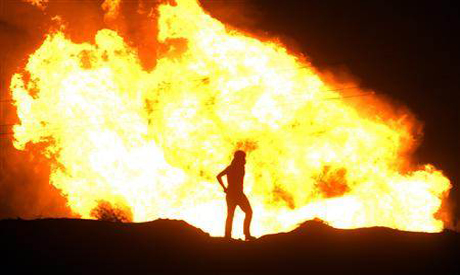
The aftermath of a pipeline attack earlier this year (Photo: Reuters)
Israel's government has approved a rise in electricity prices, brought about by disruptions to Egyptian gas supplies, despite mounting public protests against high living costs.
The state-owned electricity company did not immediately publish any price changes on Monday, though the Treasury, which approved an increase on Sunday, said the rate hike would likely be between 9 per cent and 10 per cent.
In a statement, the Finance Ministry said it had minimised the rise by lowering taxes by 69 per cent on diesel fuel, which is used in power plants, after the state-owned electricity provider signaled it had to raise its rates after months of disruptions in natural gas supply from Egypt.
The pipeline in the Egyptian Sinai has been bombed by unidentified assailants five times since the ousting of Hosni Mubarak in mid-February, halting gas flow to the Jewish state for more than 80 days.
Exports to Israel have long been a contentious issue in Egypt. The former president, currently on trial for conspiracy to murder protesters, is also facing a charge of defrauding the state treasury by selling Israel gas at below market rates.
In late June, Israel's Public Utilities Authority (PUA) said electricity prices could rise by 20 per cent in the coming years if disruptions to the Egyptian gas flow continued.
Without the government's tax rate reduction, the increase in electricity tariffs would have been about 20 per cent. But any rise in households' electricity bills seemed likely to encourage nationwide protests demanding reductions in the cost of housing, utilities and consumer goods.
Led by sharply rising prices of housing, fuel and food, Israeli inflation reached an annual rate of 4.2 per cent in June -- well above a government target of 1 to 3 per cent. That has led to a series of 10 interest rate increases since August 2009. Inflation is projected to ease to a rate of 2.9 per cent by the third quarter of 2012.
A quarter of a million people marched in Tel Aviv, Israel's commercial capital, on Saturday, under the banner of "social justice" in an escalating campaign by the country's middle class for price cuts.
Prime Minister Benjamin Netanyahu's cabinet responded to the biggest economy-related demonstration in Israel's history by naming a public committee on Sunday to open a dialogue with protest leaders.
While Netanyahu's governing coalition was seen as facing no immediate threat of being toppled by the protests, analysts were concerned that pressures to increase public spending could make it harder for Israel to meet its fiscal targets for 2012.
Finance Minister Yuval Steinitz said after Tel Aviv Stock Exchange prices fell 7 per cent on Sunday following Standard & Poor's downgrade of the United States credit rating, that he now had to "navigate the Israeli economy through very rough waters".
Despite the delicate timing, Steinitz approved the electricity hikes to help the provider to offset rising costs due to the repeated sabotage.
Egypt was the first Arab country to sign a peace deal with the Jewish state, in 1979. In recent years Israel had come to depend on gas supplied from the neighbouring country as a main fuel source for its generators.
Large natural gas fields discovered off Israel's Mediterranean shore in the past several years are expected to provide the country with gas for decades, but production is only set to begin in 2013.
Short link: